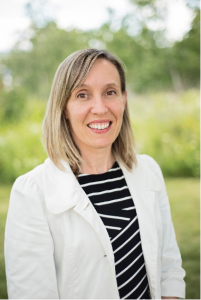 Title:
Title:
Clinical Assistant Professor
Department:
Pediatrics
Programs:
- Pediatrician, University Hospital of Northern BC (UHNBC), Northern Health
- UBC Department of Pediatrics
- UBC Northern Medical Program
- Northern Health Medical Lead for Child & Youth Health
- Co-Lead of SPRUCe (Sustaining Pediatrics in Rural and Underserved Communities), an initiative of the Rural Coordination Centre of BC
Location:
Prince George
Tell us about your role as a clinical faculty member at UBC?
I teach third year medical students from UBC’s Northern Medical Program during their six-week pediatric rotation, and I get to meet second year medical students during a course session on child maltreatment, which I facilitate. I also teach UBC family medicine residents in Prince George, as well psychiatry and pediatric residents during their hospital and ambulatory rotations in general pediatrics.
Best part of your job?
Definitely the joy of seeing happy, healthy children and their parents after a frightening illness – particularly thriving, inquisitive toddlers who have no stranger anxiety. I also really enjoy the long-term relationships that develop with my patients who live with chronic illness. It is inspiring to see them grow from childhood into young adulthood while coping with challenges that children and youth should not have to face.
Who inspires you and why?
While I am constantly inspired by women in leadership positions, I am most inspired by families who have faced profound challenges, including grief and loss. They demonstrate incredible strength and grace, and the privilege of providing support through such experiences is what makes the practice of medicine truly meaningful.
Tell us about a project or endeavour that you’ve participated in that makes you proud:
The development of the Sustaining Pediatrics in Rural and Underserved Communities (SPRUCe) network, which I undertook with my colleague Dr. Jenny Retallack. SPRUCe aims to provide education, mentorship, locum and recruitment support for rural pediatricians. These physicians do amazing work with limited resources and limited time off and we hope SPRUCe’s initiatives make their professional lives easier.
Best advice for students:
Gain strength from your friends and loved ones; believe the positive feedback you receive because it is true; find mentors (more than one) who inspire you; model your practice after those you admire; and in the words of authors Emily and Amelia Nagoski, remember that “the cure for burnout is not self-care but it is all of us caring for each other.”
How do you like to recharge?
Mountain biking with a friend, walking in the forest with my dog while listening to a funny podcast (no academic or medical podcasts allowed), or chilling out with my family while trying to silence my mental ‘to do’ list.